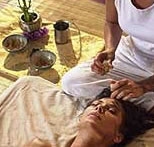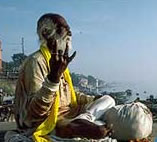|
India is no doubt emerging as the fastest growing place
for Medical treatments.
With world-class medical care, equipment and facilities now
available in
India,
patients from the United States, European and other
developed countries are coming here for treatment.

American citizens not covered by insurance - or those in
countries such as the United Kingdom where there are long
waiting lists for many National Health services - prefer
to receive treatment in a country like India where
top-tier institutions can provide high-quality health care
at a fraction of the cost:
We agree that the American & European system is excellent, but
the cost and the compulsion to send people home early is
actually stressing out many people, and they prefer to
come to our country where we can take care of them in a
more comprehensive manner.
Our training standards for doctors and nurses are those
equaling to
U.S.
levels. Indian doctors have established their credentials
all over the world. Today, 7 percent of doctors in America
are Indians and 11 percent of the specialists are Indians.
Language is another big advantage in
India. Doctors and nurses are all Indians but since most
of them are trained in United States and United Kingdom
people visiting India for treatment do not have any
problem understanding them.
The most important factor for treatment in
India is the cost factor. If we compare the cost of
treatment in United States and other European countries,
the cost spend in India for treatment including 5 star
category boarding, lodging and transportation along with
the cost of return air ticket from your country is just a
fraction of what you would have actually spent in your
country just for the treatment. (Do not forget the long
waiting time periods..)
Several medical experts say
India has established expertise in practices such as
cardiac care, cosmetic surgery, joint replacements, and
dentistry. And it has immense potential for medical
tourism as medical costs skyrocket in the United States
and other developed countries |
|
|
Hospitals in
India offer a complete range of medical treatment. You
will find that hospitals in India are equipped with the
latest medical technology and are staffed by doctors and
care-givers with world-class skills. The international
standard of care comes to you at a very reasonable price.
Some of the medical treatments available in India are
listed below.
Medical
Facilities Available in India
|
AYURVEDA
YOGA
MEDITATION
CARDIAC SURGERY AND CARDIOLOGY
- Open-heart surgery
- Angiographies
- Angioplasties
- Pediatric cardiac surgery
ORTHOPEDICS
- Total knee replacement
- Total hip replacement
- Bilateral knee replacement
OPHTHALMOLOGY
- Surgery for correction of Refraction (LASIK LASER)
- Squint correction
- Phaco-emulsification foldable lens (Cataract)
- Glaucoma |
COSMETIC PACKAGES
- Facelift
- Breast Augmentation
- Liposuction
- Nose Surgery
DENTISTRY
- Tooth extraction
- Root canal filling
- Periodontics
- Prosthetics
GYNAECOLOGY
- Laparoscopy assisted vaginal hysterectomy
- In Vitro Fertilization
ONCOLOGY
- Chemotherapy
- Radiotherapy |
What is Ayurveda?
 Ayurveda
is the system of traditional medicine in
India. It is based on many centuries of experience in
medical practice, handed down through generations.
Composed of two Sanskrit words, "Ayu" or life, and "Veda"
or knowledge, Ayurveda is regarded as "The Science of
Life" and the practice involves the care of physical,
mental and spiritual health of human beings. Ayurveda is
also based on sound ecological awareness of the place of
animals, birds and plants in relation to human life. The
time honored, well tested ancient formulas of Ayurvedic
medicines use natural herbs, minerals and even gems, to
cure disease and to promote immunity and there are no
deadly experiments on animals in the lab. Ayurveda
is the system of traditional medicine in
India. It is based on many centuries of experience in
medical practice, handed down through generations.
Composed of two Sanskrit words, "Ayu" or life, and "Veda"
or knowledge, Ayurveda is regarded as "The Science of
Life" and the practice involves the care of physical,
mental and spiritual health of human beings. Ayurveda is
also based on sound ecological awareness of the place of
animals, birds and plants in relation to human life. The
time honored, well tested ancient formulas of Ayurvedic
medicines use natural herbs, minerals and even gems, to
cure disease and to promote immunity and there are no
deadly experiments on animals in the lab.
Specialized branches of Ayurveda:
(1) Kaya Chikitsa or Internal Medicine
(2) Salya Tantra or Surgery
(3) Salakya Tantra or Management of Diseases of Eye & ENT
(4) Kaumar Bhutya or Pediatrics
(5) Bhutavidya or Psycho-Therapy including Seizures by
Evil Spirits
(6) Agada Tantra or Toxicology
(7) Rasayana Tantra or Geriatrics
(8) Vajikarana Tantra or the Science of Aphrodisiacs
What is Yoga?
 Derived
from the Sanskrit root "Yuj", to join, to unite, to
attach. The English word 'Yoke' is cognate with the
Sanskrit word Yoga. We can think of yoga as the joining of
the atma with the paramatma, the soul with God. There are
numerous means of joining with God: through action,
karma-yoga; through knowledge, jnana-yoga through
devotion, bhakti-yoga through meditation, dhyana-yoga etc.
Yoga has many other meaning. For example, in astronomy and
astrology it refers to a conjunction (union) of planets.
yogi-literally one possessed of yoga. A yogi is a
practitioner of yoga. Derived
from the Sanskrit root "Yuj", to join, to unite, to
attach. The English word 'Yoke' is cognate with the
Sanskrit word Yoga. We can think of yoga as the joining of
the atma with the paramatma, the soul with God. There are
numerous means of joining with God: through action,
karma-yoga; through knowledge, jnana-yoga through
devotion, bhakti-yoga through meditation, dhyana-yoga etc.
Yoga has many other meaning. For example, in astronomy and
astrology it refers to a conjunction (union) of planets.
yogi-literally one possessed of yoga. A yogi is a
practitioner of yoga.
A yogi is one who consciously unifies
body, mind, emotions, and spirit
The yogi strives to open the gift of life and discover his
fullest possibilities. A yogi endeavours to discover the
higher consciousness and how the body, mind, and emotional
nature can be truly fulfilled through unifying their
purposes - rather than living in constant interior civil
war
Yoga is described in its eight forms:
Bhakti Yoga
Karma Yoga
Janana Yoga
Raja Yoga
Mantra Yoga
Laya Yoga
Tantra Yoga
Hatha Yoga
What is Meditation?
Meditation usually refers to a state of extreme relaxation and
concentration, in which the body is generally at rest and
the mind quieted of surface thoughts. Several major
religions include ritual meditation; however, meditation
itself need not be a religious or spiritual activity. Most
of the more popular systems of meditation are of Eastern
origin.
Meditation is an easy and simple way to balance a person's
physical, emotional, and mental states. It is easily
learned and has been used as an aid in treating stress,
anxiety, pain management, and as part of an overall
treatment for other conditions including hypertension and
heart disease. Research shows that meditation decreases
the heart rate, respiratory rate, oxygen consumption, and
even decreases blood pressure.
Meditation as a form of alternative medicine brings about
mental calmness and physical relaxation by suspending the
stream of thoughts that normally occupy the mind.
Generally performed once or twice a day for approximately
20 minutes at a time, meditation is used to reduce stress,
alter hormone levels, and elevate one's mood.
Medical Facilities
Available in India
Indian corporate hospitals excel in Cardiology and
Cardio-Thoracic Surgery, Joint Replacement, Orthopedic
Surgery, Gastroenterology, Ophthalmology, Transplants and
Urology to name a few. The various specialties covered are
Neurology, Neurosurgery, Oncology, Ophthalmology,
Rheumatology, Endocrinology, ENT, Pediatrics, Pediatric
Surgery, Pediatric Neurology, Urology, Nephrology,
Dermatology, Dentistry, Plastic Surgery, Gynecology,
Pulmonology, Psychiatry, General Medicine & General
Surgery.
The various facilities in India include full body pathology,
comprehensive physical and gynecological examinations,
dental checkup, eye checkup, diet consultation, audiometry,
spirometry, stress & lifestyle management, pap smear,
digital Chest X-ray, 12 lead ECG, 2D echo colour doppler,
gold standard DXA bone densitometry, body fat analysis,
coronary risk markers, cancer risk markers, carotid colour
doppler, spiral CT scan and high strength MRI. Each test
is carried out by professional M.D. physicians, and is
comprehensive yet pain-free.
There is also a gamut of services ranging from General
Radiography, Ultra Sonography, Mammography to high end
services like Magnetic Resonance Imaging, Digital
Subtraction Angiography along with intervention
procedures, Nuclear Imaging. The diagnostic facilities
offered in
India are comprehensive to include Laboratory services,
Imaging, Cardiology, Neurology and Pulmonology. The
Laboratory services include biochemistry, hematology,
microbiology, serology, histopathology, transfusion
medicine and RIA.
All medical investigations are conducted on the latest,
technologically advanced diagnostic equipment. Stringent
quality assurance exercises ensure reliable and high
quality test results. |
|
|
The best part about treatment in
India
is that you enjoy world-class medical advantages at a
fraction of the cost in comparison with destinations like
US,
Europe,
Africa and the Middle East. Here are some examples of your
medical price savings:
Coronary Artery Bypass Grafting (CABG) is the reason for 55.7%
of hospital stays (billed to Medicare).
Next on the list is angioplasty, accounting for 48.7% of
hospital stays.
And what do you save when you get treated in
India? If you come for bypass surgery, you will save over
60%, after taking airfares and local stay into
consideration.
|
Nature of Treatment |
Approximate Cost in India ($) |
Cost in other Major Healthcare Destination ($)
|
Approximate Waiting Periods in USA / UK
(in months) |
|
Open heart Surgery |
4,500 |
18,000 |
9 - 11 |
|
Cranio-facial Surgery and skull base
|
4,300 |
13,000 |
6 - 8 |
|
Neuro-surgery with Hypothermia |
6,500 |
21,000 |
12 - 14 |
|
Complex spine surgery with implants |
4,300 |
13,000 |
9 - 11 |
|
Simple Spine surgery |
2,100 |
6,500 |
9 - 11 |
Simple Brain Tumor
- Biopsy
- Surgery |
1,000
4,300 |
4,300
10,000 |
6 - 8 |
Parkinsons
- Lesion
- DBS |
2,100
17,000 |
6,500
26,000 |
9 - 11 |
|
Hip Replacement |
4,300 |
13,000 |
9 - 11 |
|






